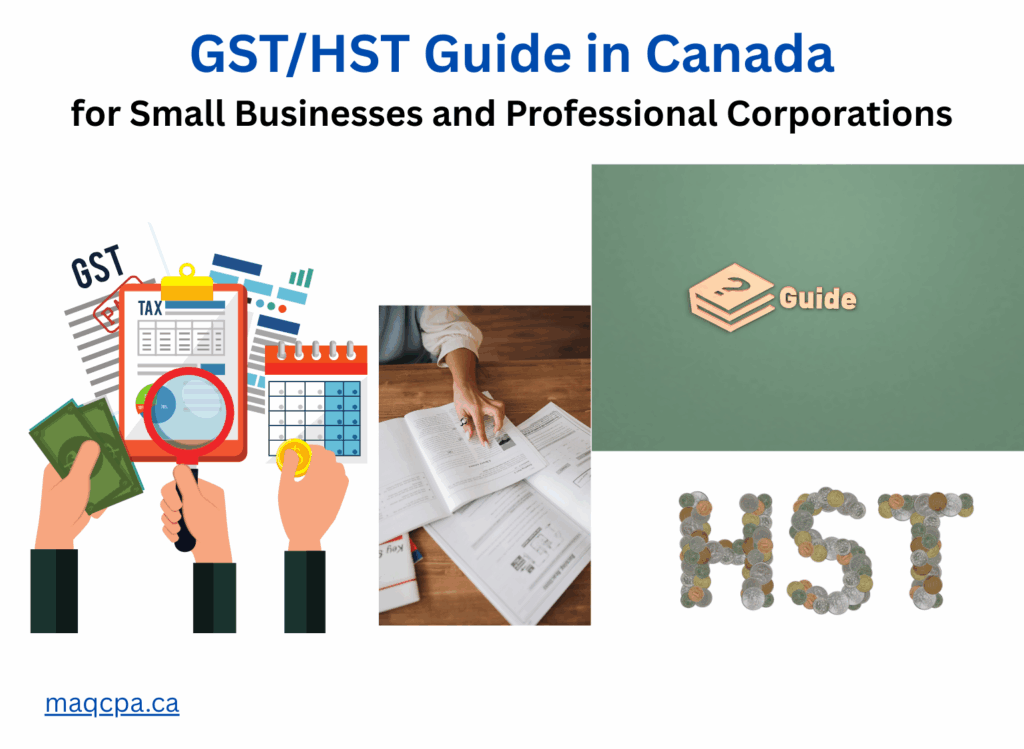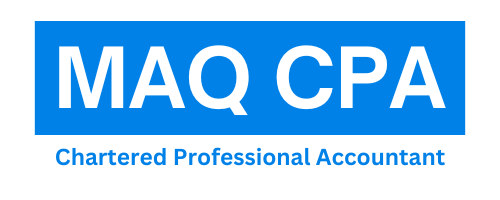If you’re running a small business or professional corporation in Canada — especially in the Greater Toronto Area — understanding your Goods and Services Tax (GST) and Harmonized Sales Tax (HST) obligations isn’t optional. It’s essential. This GST/HST guide helps you understand it and its requirements.
Whether you’re a family doctor with a medical professional corporation, a freelance consultant, or a startup in downtown Toronto, GST/HST compliance affects your cash flow, invoicing, and filing obligations.
In this GST/HST guide, we break down how GST/HST works, who needs to register, how to file, and what professional corporations should watch out for.

Key Takeaways
- GST is a 5% federal tax; HST combines GST with provincial tax in some provinces.
- If your revenue exceeds $30,000, registration is mandatory.
- Small suppliers under $30K may register voluntarily to claim Input Tax Credits (ITCs).
- Filing can be monthly, quarterly, or annually depending on your revenue.
- Professional corporations like for doctors, dentists may be exempt from charging GST/HST depending on services offered.
- Mistakes such as missing deadlines or charging GST/HST incorrectly can trigger CRA penalties.
What Is GST/HST and Who Needs to Register?
GST (Goods and Services Tax) is a federal value-added tax, currently set at 5%.
HST (Harmonized Sales Tax) is a combination of GST and a provincial sales tax, collected together in provinces like Ontario (13%).
You must register for GST/HST if:
- Your business has taxable revenues exceeding $30,000 in a single calendar quarter or over four consecutive quarters.
This applies to:
- Sole proprietors
- Partnerships
- Incorporated businesses
- Professional corporations (e.g., medical, legal, dental)
🔹 Voluntary registration is allowed even if under the threshold, particularly if you want to claim Input Tax Credits (ITCs) on business purchases.
How GST and HST Work Across Provinces
Rates shown above are updated in July 2025.
➡️ Businesses charge tax based on the province where the service or product is delivered. This is where you make your sale, lease or other supply.
When and How to Register for GST/HST
✅ When to Register:
- Once you exceed $30,000 in worldwide taxable revenues (including associates) over the last four consecutive calendar quarters.
🧾 How to Register:
- Online via CRA My Business Account:
CRA GST/HST Registration - By phone or mail
- Through your accountant or tax representative
You’ll receive a Business Number (BN) with a GST/HST program account (e.g., 123456789RT0001).
Charging and Collecting GST/HST
You must charge GST/HST on all taxable goods and services. This includes:
- Consulting services
- Digital products
- Rental income from commercial property
- Legal or financial advisory services
Notable exemptions:
- Medical services (physicians, chiropractors, physiotherapists)
- Residential rent
- Childcare services
👉 Tip: Make sure your invoices display your GST/HST number and tax breakdown correctly.
Claiming Input Tax Credits (ITCs)
What are ITCs?
Input Tax Credits let you recover the GST/HST paid on expenses related to your commercial activities.
You can claim ITCs on:
- Office supplies
- Professional services (accountants, lawyers)
- Business software
- Advertising
Common ITC Restrictions:
- Personal-use portion of mixed-use expenses
- Meals and entertainment (only 50% eligible)
- Vehicle expenses without proper logs
💡 CRA Tip: Keep all receipts and supporting documents for six years.
How to File and Remit GST/HST to the CRA
Filing Frequency:
| Annual Revenue | Filing Frequency | Remittance Frequency |
| ≤ $1.5M | Annually | Annually / Quarterly |
| $1.5M – $6M | Quarterly | Quarterly |
| > $6M | Monthly | Monthly |
Filing Methods:
- Online via CRA My Business Account
- Authorized representative (CPA)
- Paper filing (limited)
Payment Options:
- Pre-authorized debit
- Online banking
- Credit unions
- Cheque
⏰ Deadlines vary by filing frequency — annual filers have 3 months after fiscal year-end.
Common GST/HST Mistakes and How to Avoid Them
| Mistake | How to Avoid |
| Not registering on time | Monitor revenue thresholds monthly |
| Overclaiming ITCs | Keep detailed receipts and exclude ineligible expenses |
| Charging the wrong rate | Use CRA’s GST/HST Calculator: CRA GST/HST Rates |
| Missing deadlines | Set reminders or hire a CPA |
| Not applying exemptions | Verify if your service is tax-exempt (e.g., health care) |
GST/HST for Professional Corporations
Physicians and Dentists:
Most services are exempt under the Excise Tax Act, meaning:
- You don’t charge GST/HST
- You also cannot claim ITCs on related inputs
Lawyers and Accountants:
Most services are taxable, and:
- You must register and charge GST/HST
- You can claim full ITCs on eligible business expenses
👨⚕️👩⚖️ Pro tip: A professional corporation must still track all GST/HST collected and remitted, even if part of the services are exempt.
FAQ
1. Do small businesses under $30K need to register for GST/HST?
No, but voluntary registration may be beneficial to claim ITCs on business expenses.
2. Can I charge GST/HST if I’m not registered?
No. Charging tax without registration is illegal and could lead to penalties.
3. Are online or digital services taxable?
Yes, most digital goods and services sold in Canada are taxable, even from non-residents.
4. Is GST/HST charged based on billing address or service location?
Generally, it’s based on the place of supply, which is where the customer receives the goods or service.
5. What if I provide services in multiple provinces?
You must charge the correct provincial rate depending on your customer’s location.
Final Words
Whether you’re a small business in Scarborough or a legal professional corporation in Toronto, understanding and complying with GST/HST rules is non-negotiable. Filing late or charging the wrong rate can trigger CRA reviews, audits, and penalties. Follow this GST/HST guide to review your own situation.
📞 Need help with GST/HST registration or filing? We, Small Business Accountant Toronto, can take the stress out of compliance — so you can focus on growing your business.
Read our GST/HST return filing services.
Disclaimer
The information provided in this blog is for general informational purposes only and does not constitute professional accounting, tax, financial, or legal advice. While we strive to ensure the accuracy and timeliness of the content, the information may not apply to your specific situation or reflect the most current legislative changes. Readers are strongly advised to consult a qualified professional before making any decisions based on the content of this blog. MAQ CPA and its representatives disclaim any liability for any loss or damage incurred as a result of reliance on any information provided herein.
